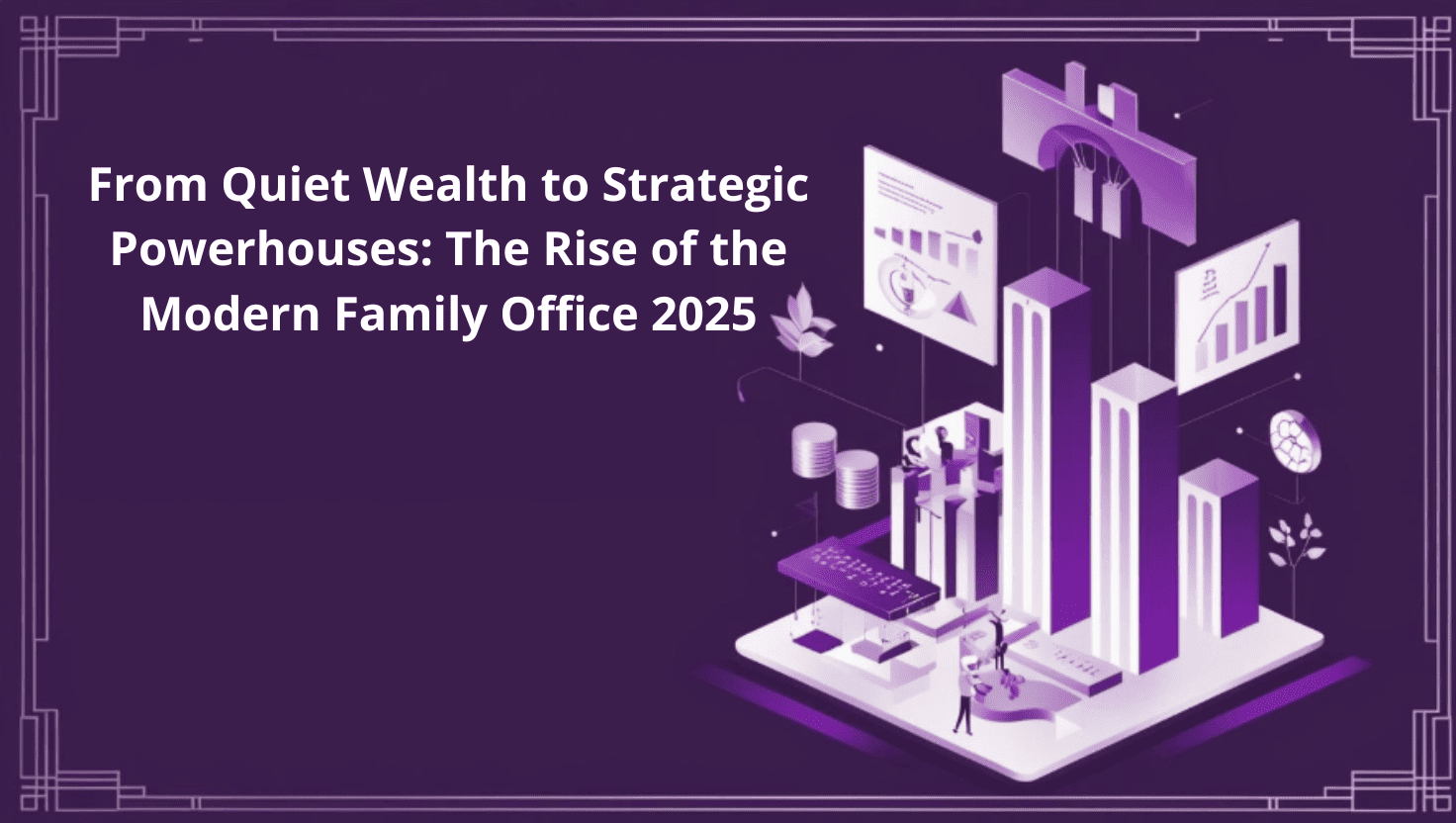
Best Sources for Private Company Valuation Multiples by Industry
The best sources for private company valuation multiples by industry, how investors use them, and key limitations in private market analysis.

Modern family office investing is reshaping private markets, with families becoming key drivers of innovation, impact, and strategic capital allocation. Family offices – once known for their discretion and quiet preservation of wealth – are now emerging as some of the most agile and strategic investors in the private markets. As capital becomes more personal and value-driven, family offices are no longer just stewards of generational wealth. They are active participants, influencing sectors, shaping deal structures, and redefining what it means to invest with purpose.
Traditionally, family offices focused on capital preservation, tax optimization, and estate planning. But today, many are pivoting towards direct investing – placing capital into startups, real estate, and private companies without going through intermediaries. This hands-on approach allows families to maintain control, ensure alignment with their values, and pursue more competitive returns.
In 2021 alone, family offices accounted for 934 direct deals worth over $227.6 billion globally – a record high (Campden Wealth, 2022). These are no longer just minor side bets; some families are leading or anchoring entire transactions. According to Campden Wealth, direct investing by family offices hit a record high in 2021 with 934 transactions worth over $227.6 billion globally.
Another key shift is the rise of co-investing. By partnering with venture capital or private equity firms, family offices gain access to larger, often exclusive deals while retaining autonomy over their capital. The typical co-investment ranges from $5 to $20 million – large enough to make an impact without overconcentration (Institutional Investor, 2023).
This collaborative approach enables family offices to:
Platforms like DealPotential are now playing an essential role in this ecosystem, helping family offices discover deals and co-investors that align with their sector interests and investment strategies.
As family offices become more sophisticated, they are narrowing their focus to specific sectors where they have expertise or strong conviction. Technology, healthcare, and renewables are popular areas – with tech-driven ventures being particularly attractive.
According to McGurran (2024), 75% of family offices now invest in venture deals, nearly double the rate from a decade ago. This reflects the influence of younger generations and a desire to capitalize on innovation.
Rather than broad diversification, many offices now build portfolios around themes – such as climate tech, longevity, or financial inclusion – creating more tailored, high-conviction strategies.
In 2021 alone, family offices accounted for 934 direct deals worth over $227.6 billion globally – a record high (Campden Wealth, 2022). These are no longer just minor side bets; some families are leading or anchoring entire transactions. According to Campden Wealth, direct investing by family offices hit a record high in 2021 with 934 transactions worth over $227.6 billion globally.
For today’s family offices, it’s not just about growing wealth – it’s about creating impact. Impact investing has become central to many portfolios, driven by a generational shift and a growing desire to align capital with values.
Gunung Capital (2025) reports that in 2022, the transaction volume of impact investments surpassed that of traditional investments for family offices. Clean energy, education, and microfinance are among the most active areas, where returns are expected – but so is measurable change.
Unlike traditional philanthropy, impact investing is structured to deliver both financial and social outcomes. Families are increasingly formalizing their commitments with dedicated ESG mandates and metrics.
Behind the scenes, family offices are evolving structurally. What was once a small, family-run operation has become a professionally managed investment entity. Over 70% of family offices now have formal governance, investment policies, and performance reviews in place (PwC, 2023).
They are also collaborating more than ever before. Networks, forums, and digital platforms allow family offices to share insights, compare notes, and syndicate investments. This openness is a significant departure from the traditionally isolated nature of family wealth management.
With platforms like DealPotential facilitating this ecosystem, family offices are finding peers with shared interests and building strategic alliances. Whether it’s co-investing in a biotech startup or joining a green infrastructure deal, these networks are empowering more effective capital deployment.
Family office investment trends in 2025 reflect a global shift toward active, value-driven private market investing. Reflects a broader shift in global capital: it’s becoming more active, more intentional, and more personal. For private market investors, this presents both opportunity and challenge. If you’re seeking capital from a family office, it’s no longer just about financial metrics. You need to demonstrate vision, values, and long-term alignment.
Family offices are no longer the quiet custodians of yesterday. They are strategic powerhouses, reshaping private markets and driving innovation, sustainability, and impact. And they’re doing it with a unique combination of patient capital, flexibility, and purpose
References
Book a free demo with DealPotential and get real-time insights on the next billion-dollar opportunities.
SHARE:

The best sources for private company valuation multiples by industry, how investors use them, and key limitations in private market analysis.

AI-driven due diligence software helps M&A teams assess companies earlier. DealPotential supports early-stage commercial due diligence.

Predict future M&A deals using early indicators and AI signals. Learn how DealPotential identifies acquisition-ready companies earlier.
We use cookies to improve your experience, analyze web traffic, deliver customized content, and support marketing efforts.
DealPotential Investment Intelligence Platform Proposal Agreement
WHEREAS, the Seller agrees to provide access to the DealPotential Investment Intelligence Platform,
WHEREAS, the Client agrees to purchase the DealPotential Investment Intelligence Platform according to the terms and conditions laid out in this contract.
THEREFORE, in consideration of the mutual agreement made by the parties hereto, the Seller and the Purchaser (individually, each a “Party” and collectively, the “Parties”) agree to the following:
2. Subscription: By subscribing to the Platform, you agree to pay the monthly or yearly subscription fee, as specified in your subscription plan.
3. Payment: Payment is due monthly in advance and processed via Stripe. The subscription renews automatically until cancelled.
4. Cancellation: You may cancel your subscription at any time, and it will take effect at the end of the current billing cycle. No refunds will be provided for partial months.
5. Data Privacy: We are committed to safeguarding your data. Please refer to our Privacy Policy for details on data handling and protection.
6. Intellectual Property: All content, data, and reports provided by the Platform are protected by intellectual property laws and are for your internal use only.
7. Termination: We reserve the right to terminate your access to the Platform for any violation of these terms or for any reason at our discretion.
8. Governing Law: These terms are governed by the laws of Sweden, and any disputes shall be subject to the exclusive jurisdiction of the courts in Sweden.
10. Disclaimer: We disclaim all responsibility for any decisions made by users based on the data provided in our platform. All investment decisions are solely the responsibility of the user. We are not involved in any user decisions and only provide data and assessments for informational purposes.